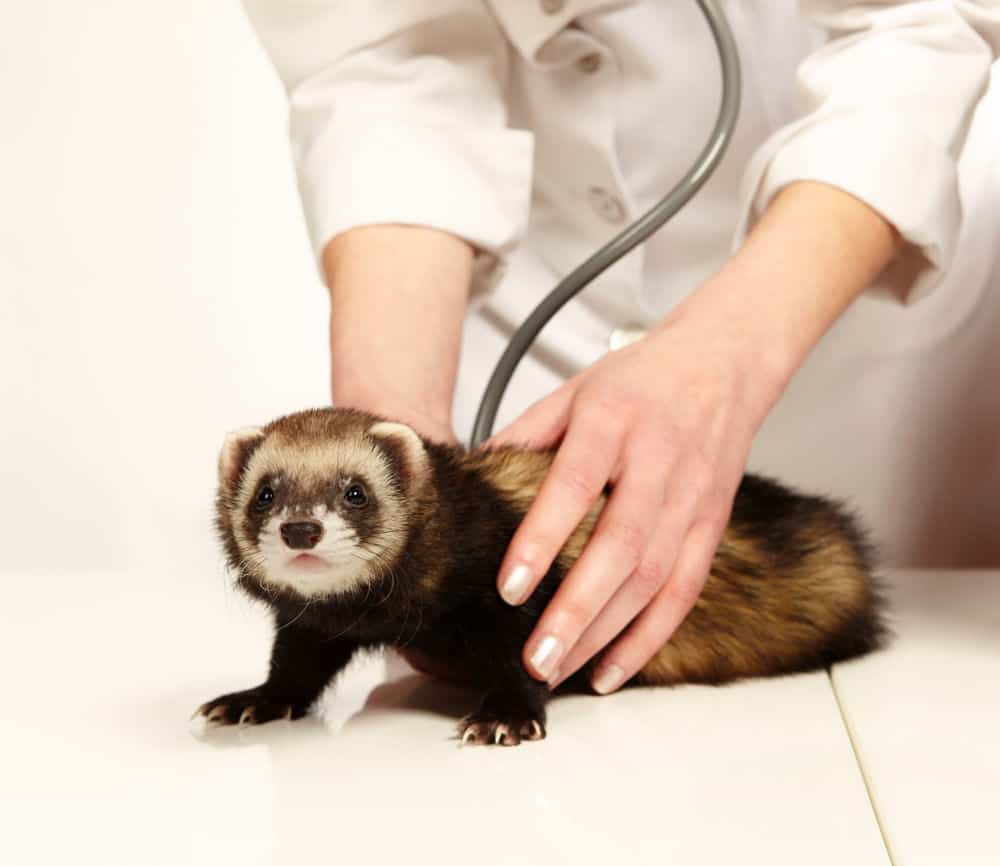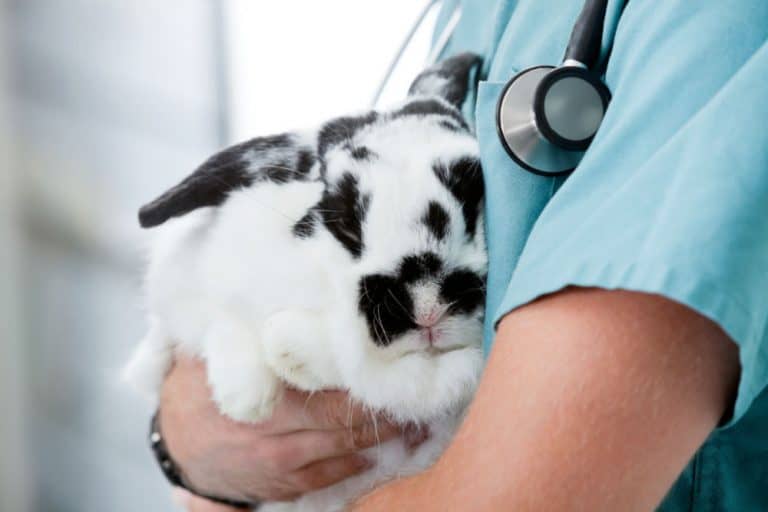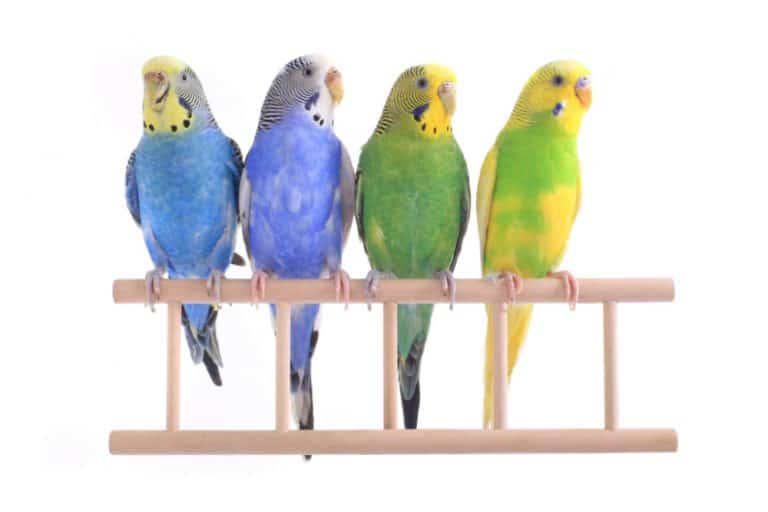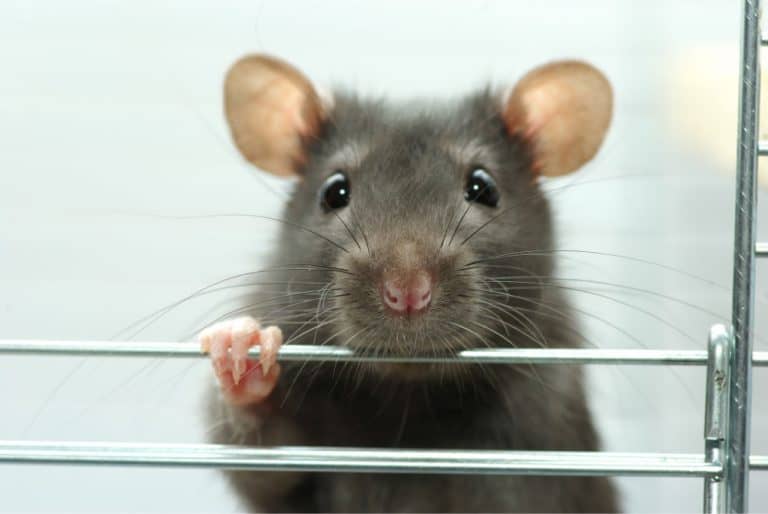How To Tell If A Ferret Is In Pain: 20 Signs To Look For
Wouldn’t it be wonderful if we could talk to our ferrets? We could just ask them if they are happy and what they want. It would be especially useful in situations where they are getting into trouble. But most of all, it could help us understand when our ferrets are sick. Asking them what hurts and how it feels could solve a lot of mysteries.
Unfortunately, though, this isn’t possible. Instead, we have to rely on our ability to read a ferret’s body language. The way they act and sound gives you plenty of clues if they are happy or feel bad. Let’s talk about how to tell if a ferret is in pain and 20 signs to look for.
*Disclaimer*
We are not a licensed vet, and this information is not to be used to diagnose or treat any illness. This article is for information purposes only. If you suspect that your pet is sick, we recommend contacting a certified vet immediately.
Common Illnesses
Before getting into how to tell if a ferret is in pain, you should know what your ferret is prone to. Here are a few common diseases.
Parasites: There are several external and internal parasites that your ferret can get. Things like mites and fleas are well-known. But ferrets can also get heartworms, tapeworms, and giardia, to name a few. You can treat external parasites with over the counter medications. But if your ferret has internal parasites, it will need to be seen by a vet.
Congestive Heart Failure: Heart disease could be genetic or the result of past illness. It is especially common in ferrets that have had heartworms. To diagnose heart disease, your vet will need to run blood work and do a few tests. You can manage the early stages of heart disease with medication. But it likely won’t go away.
Distemper: Distemper is preventable by yearly vaccines all across the USA. It starts in the form of a cold with sneezing, nose and eye discharge, and wheezing. And if left untreated, it can progress into rashes, seizures, and an immunocompromised system.
Ringworm: Contrary to what you might think, ringworm is actually a fungal infection. It is highly contagious and will spread from skin to skin contact. It usually looks like round red, flaky sores that itch, but few types don’t form the classic circles. And the worst part is that ringworm is a zoonotic disease, which means it can pass from animal to people. But don’t worry because you can treat it quickly with an antifungal cream.
Tumors And Lymphoma: Benign and cancerous tumors are widespread in ferrets. As your ferret ages, you might find firm lumps growing just under the skin. These tumors could be harmless, but you should always have a vet check their size. They might decide to biopsy and remove the tumor to be safe.
Hyperestrogenism: This is the result of females having too much estrogen. You don’t have to worry about hyperestrogenism in spayed females. Spayed females are not at risk of this at all. But if you don’t fix your ferret and don’t intend to breed her, she will inevitably develop it. Signs of this are anemia, lethargy, and a swollen vulva.
Diabetes: Difficulties regulating blood sugar is a problem with a lot of ferrets. If your ferret is continuously hungry, but on the thin side, diabetes could be a factor. Another sign of diabetes is urinating frequently and drinking lots of water. Most ferrets can get a simple blood test from the vet to determine if they have diabetes. Once diagnosed, they might need insulin and an adjusted diet.
Insulinoma: And finally, ferrets are prone to pancreatic cancer. Some of the most notable signs are stargazing, rubbing the mouth, and lethargy. A vet can diagnose this type of cancer. If the tumor isn’t severe, a vet could remove it without issues. Otherwise, vets tend to recommend medications to control blood sugar along with diet changes.
How To Tell If A Ferret Is In Pain: 20 Signs To Look For
Now that you know the most common ailments, you can start to look for the signs. This is the tricky part of pet ownership. Since ferrets have the instinct to hide their weaknesses, it can make it hard to see the symptoms. But knowing their body language can help you catch small shifts in their behavior, tipping you off that they are in pain.
#1 Excessive Licking
Most animals lick in areas that are hurt and have open wounds. Some even lick when they have allergies or itchiness in their feet. Scientists have long wondered why animals lick their wounds. One would think that saliva is dirty and cause an infection.
In recent studies, scientists might have found the answer. Saliva contains an enzyme called lysozyme. Lysozyme helps promote blood-clotting and fights against bacteria.
So if you notice your ferret licking an area, you might want to check them over. Your ferret might have sores, cuts, or even an infection that they are trying to heal. You can help their healing along by dabbing a bit of original Neosporin on it. The cream will protect the cut and prevent infections.
#2 Hiding
Ferrets might act like they are at the top of the food chain. But even they know that they are vulnerable when sick. When a ferret is sick, they can’t defend themselves, so their instinct is to hide. Even your domesticated ferret will have this instinct to guard himself in times of weakness. While hiding isn’t a symptom of a specific disease, it is a good indicator of pain.
If you notice that your ferret is hiding more, it’s a good sign that they are in distress. But you shouldn’t force a ferret out of their hiding spot. If a ferret is hurt, you could worsen the injury by tugging at them. Instead, gently coax them out with a treat or favorite toy. Once they are out of hiding, you can take that time to inspect them.
#3 Aggression/Biting
Believe it or not, aggression could be a sign of pain in a lot of animals. When your ferret is in pain, they don’t want cuddles or to play with you. Sometimes they will go as far as guarding their cage against you and other cage mates.
If your sweet-tempered ferret suddenly becomes aggressive, you might consider pain as the cause. But this type of change doesn’t usually happen because of a superficial injury. It usually occurs in more severe illnesses.
If you don’t find cuts or bumps on your ferret, you might consider the issue internally. Watching your ferret closely, you might even find other signs of illness and pain to solve the mystery. And all of that information will help your vet diagnose your baby sooner.
#4 Scratching
Ferrets can be prone to several skin conditions, allergies, parasites, and fleas. If you notice that your ferret is scratching more than usual, you should take a careful look. Scratching is a sure sign that your ferret is in distress or pain. Inspect that your ferret doesn’t have fleas, rashes, or irritated skin and treat according to the problem.
If you don’t see topical signs that your ferret is sick, the next step is to examine their environment. While not common, scratching could be a sign of mental distress. It can become a tick caused by depression or boredom. To combat this, you should give extra playtime, toys, and enrichment. Perking up your slinky baby will resolve the issue in no time.
#5 Grinding Teeth
Another way how to tell if a ferret is in pain is by listening to their teeth. Tooth grinding is a loud and obvious sign that your ferret is in pain. It is also a sure sign that your ferret has a stomach ache.
Common reasons your ferret might have an upset stomach is that they have eaten something bad. In this case, your ferret could have a hard time passing the object. To relieve this pain, you should talk to your vet about x-rays to locate the item. In many cases, a ferret will pass it on their own. But on occasion, it can become lodged and needs help to unblock the intestines.
Another reason your ferret might have a sour stomach is if you changed food recently. Slow transitions to new food over a week’s time help relieves this problem. And it’s always a possibility that your ferret’s stomach doesn’t agree with it. Then it’s back to the drawing table for the best diet for your slinky.
#6 Limping/Favoring A Side
Ferrets love to play and pounce all day. They never seem to slow down unless they are sleeping. And even then, they dream of games. A telltale sign that your ferret is in pain is that they start to limp or favor a limb.
To resolve this issue, you should first check the paw pads. Make sure that there are no thorns or sharp objects between the toes and pads. If you find something, you can remove it with tweezers and cover with antibacterial ointment to prevent infection.
Next, you should check the limbs for signs of a break. Most of the time, you can identify these through lumps or swollen areas on the leg. But you can’t treat a broken limb at home. It’s best to take your ferret to the vet’s office to prevent the break from getting worse.
And finally, you should check the joints. It isn’t uncommon for a ferret to dislocate a shoulder or hip. You can usually massage these back into place. But in severe cases, your ferret will need an x-ray to determine how to proceed.
#7 Loss Of Appetite
Appetite is an excellent way how to tell if a ferret is in pain. A healthy, happy ferret eats without any problems. But when a ferret starts to get sick, the first thing that goes is their hunger. Lack of food motivation could be a sign of an upset stomach, tooth abscess, or other serious illness.
If your ferret has an upset stomach, you will see teeth grinding or diarrhea too. Depending on the cause of the upset stomach, it will need different treatment. If you changed food, you might consider switching back to relieve the problem.
But if you suspect sores in the mouth, you could try to check for bleeding, infections, or splinters. Using an otoscope, you could try to get a look inside the mouth. This isn’t as easy as it sounds, though. And it might take a couple of people to hold the ferret still. Just remember to be gentle and don’t force it. Ferrets do not appreciate objects going into their mouths unless it’s their idea. If you find anything, again, make an appointment with your vet immediately for treatment options.
If a sick ferret goes too long without eating, they lose all the nutrients they need to get better. So if your ferret still isn’t better after a few days, you should make a trip to the vet. They will do all the necessary checks and blood work to rule out all possibilities. They might even send you home with directions on syringe feeding your ferret.
#8 Weight Loss
Many people put weight loss and appetite hand in hand. And while it makes sense that if your ferret isn’t eating, they will lose weight. But weight and muscle loss can happen for many reasons.
Internal parasites are a prevalent reason for rapid weight loss. Your ferret might have a hungry and healthy appetite but losing weight. And while your ferret won’t feel parasites at first, it can be painful in later stages.
#9 Lethargy
How to tell if a ferret is in pain? An obvious sign to look for is lethargy. People love ferrets for their vibrant, playful energy. But a ferret in pain is droopy, slow, and not excitable. And when your ferret is not his usual self, it can be a little distressing.
Lethargy is a symptom of most illnesses. Other symptoms usually accompany that better diagnose the problem. So keep a lookout for other signs that you might have missed. If you treat for the ailment and get your ferret eating well, their energy usually perks right up.
#10 Not Using Litter Box
If your ferret is litter trained, accidents happen few and far between. But if you notice that your ferret is peeing everywhere more often, pain and illness could be the problem. The most common underlying issue is a urinary tract infection, which is painful and uncomfortable when left untreated.
With a dose of antibiotics and plenty of fluids, your slinky baby will be right back to normal. Suddenly, not using a litter box could be a sign of incontinence, kidney disease, or cancer in more severe cases.
#11 Change In Urine Color
Urine color is a gateway for how to tell if a ferret is in pain. Your ferret might still make it to the litter box on time, but the color might be off. Normal ferret urine is brown to orange with slight cloudiness. But if you notice a green tinge to it, there might be a serious issue.
Green urine is often a sign of heartworms, bladder infection, and even anemia. All of which could cause pain while urinating, muscle aches, and difficulty moving around. You should see a vet immediately after seeing a change in urine color.
#12 Panting
Panting is a normal function to cool off after a rough wrestling match. If your ferret has just finished running around, playing, and having a good time panting is normal. But panting followed by wheezing without activity could be a sign of distress.
In warmer climates, your ferret may be overheating. To combat this, give your ferret cool but not cold water. You can also move to a cooler area of the house. Or use chilling blocks made from granite or tile for your ferret to lay on.
Panting and wheezing could also be a sign of heartworms. Heartworms start in the lungs, where they live in the alveoli. The alveoli are where oxygen exchange happens in our blood. So if there are worms in the way, your ferret isn’t breathing correctly. Hence the labored breathing.
#13 Whimpering/Screaming
If your ferret whimpers a little when touched or moving around, they could be in pain. Pain with touch is usually a sign that your ferret had an accident. Sometimes they get a little rambunctious while playing, and accidents happen. They could slip and fall, damage a joint, and bruise just like us. In the case of a broken bone, you should call a vet. But scrapes and bumps will heal with time. Just give your ferret extra love and cuddles to get better.
#14 Trouble Eating
Ferrets are known for their bad table manners. They get messy and spill food often. But occasionally you might notice some difficulty eating. Especially if you feed dry food, you might see left behind crumbles of food. These half-eaten pieces may indicate pain in the mouth.
Things like broken teeth, damaged gums, or sores are the usual culprits of eating trouble. If you suspect any of these, you should make an appointment with an experienced vet. In the case of broken teeth, your vet might decide to remove them to prevent nerve damage. And for damaged gums and sores, simple antibiotics will heal your baby up.
#15 Lumps On Butt
Ferrets have anal glands that can get infected like dogs. If you notice bumps around the base of your ferret’s tale, they might be impacted. These infections are painful and make going to the bathroom uncomfortable.
In less severe cases, you can treat this at home. With a warm rag and some gloves, you could express the anal glands. All you need to do is use a warm compress on the anus to loosen the muscles. Then gently squeeze both sides of the anus right under the base of the tail.
#16 Inflamed Vulva
There is a reason that breeders spay all ferrets. And that reason is hyperestrogenism. The most common symptoms of this are going into heat frequently, anemia, and inflamed vulva. These symptoms are irritating to your female and very painful if left untreated. It can also lead to cancer if never corrected. The best way to treat hyperestrogenism is to spay your female.
#17 Not Grooming
Ferrets might be stinky babies, but they actually groom themselves frequently. It might not be enough to keep them clean and smelling nice, but it does fluff their fur and keeps it looking tidy. A sign that your ferret might be sick or in pain is that they stop grooming. You will notice this by your ferret’s fur looking oily, unkempt, and not as smooth.
If you notice that your ferret isn’t grooming themselves anymore, look for other signs. You will generally see this symptom along with several others to diagnose your ferret.
#18 Squinting Eyes/ Goopy Eyes
Whether your ferret is squinting because they are weak, or their eyes hurt. Squinting is a cause for concern. When you notice your ferret squinting, your first step is to look at it in the light. You will want to look for scratches, debris, or goop in the eyes.
Scratches on the cornea can be very irritating and painful. In some cases, they can even get infected. To be safe, a vet should look at the scratch and prescribe an antibiotic ointment safe for the eyes.
If you find debris, you can do a saline flush to clear the eye. Using contact saline, you can squirt a few drops into the eye until the dirt comes out. Never rub the eye to prevent sharp pieces from scratching your ferret’s eye.
And finally, goopy eyes can be a sign of allergies or an upper respiratory infection. You will know the difference because allergies produce clear drainage. Infections usually have cloudy, mirky, and yellow to green discharge. While the infection isn’t painful, it is very uncomfortable and miserable for your ferret. So it should get the treatment it needs.
#19 Shaking
How to tell if a ferret is in pain? Many times if the injury is intense, they will have tremors and shaking. But this shouldn’t be confused with vibrating or shivering. Most ferrets make little vibrations with their body when they are happy and content. Some even do it right when they wake up like a morning stretch.
There are many reasons your ferret could be shaking. And usually, your ferret will have other symptoms in conjunction with it. If your ferret is in that much pain, a trip to the emergency clinic should be considered.
#20 Loss Of Color
Your ferret’s gums should be pink and healthy, and their nose moist and pink. If you notice a sudden loss of color in either of these places, anemia might be to blame. While acute anemia isn’t painful, progressive stages can be dizzying and cause muscle cramps.
Anemia can occur on its own, but it is also a symptom of other illnesses. So before attempting to treat anemia at home, consult your vet. If the case is severe enough, nothing you do at home will help.
First Aid For Ferrets
As you can see, there is a lot that can go wrong with ferrets. Not only are they prone to diseases, but they are also accident-prone. But you don’t want to be caught in an emergency without the tools you need. We always recommend having an emergency kit. You never know when you will need it, but it wouldn’t be the worst if you never do.
Here is a list of the best things to put in your Ferret First Aide:
- Saline– for flushing eyes and wounds.
- Gloves– to protect your ferret and your hands
- Neosporin-for cuts and burns
- Self Adhering Bandages And Gauze– temporary coverings to prevent infections
- Cornstarch– great blood clotting powder for injuries
- Baby Food– to entice eating when they are on a food strike
- Unflavored Pedialyte– for hydration
- Syringe– to feed or give medications
- Pepto– Ask your vet for dosage
You will be prepared for almost anything with these items. They might not cure your ferret on the spot. But they can make them comfortable until you can see a vet.
How To Keep A Healthy Pet?
Keeping a healthy ferret is simple. Feeding a proper diet is the key to all health. Even the slightest deficiency could lead to illness. So make sure to check your ferret’s diet often to make sure they are getting everything they need.
Next, give them lots of safe playtime and attention. At least as safe as it can be for a ferret. Most accidents and injuries occur during playtime, so ferret-proofing regularly is a must. Attention makes anyone feel loved and wanted. Giving your ferrets love increases their endorphins and boosts the immune systems.
And finally, regular check-ups. With semi-annual check-ups, your vet can spot any differences and abnormalities. The sooner those inconsistencies are spotted, the faster your ferret will mend.
You might never need to know how to tell if a ferret is in pain with these few steps.







